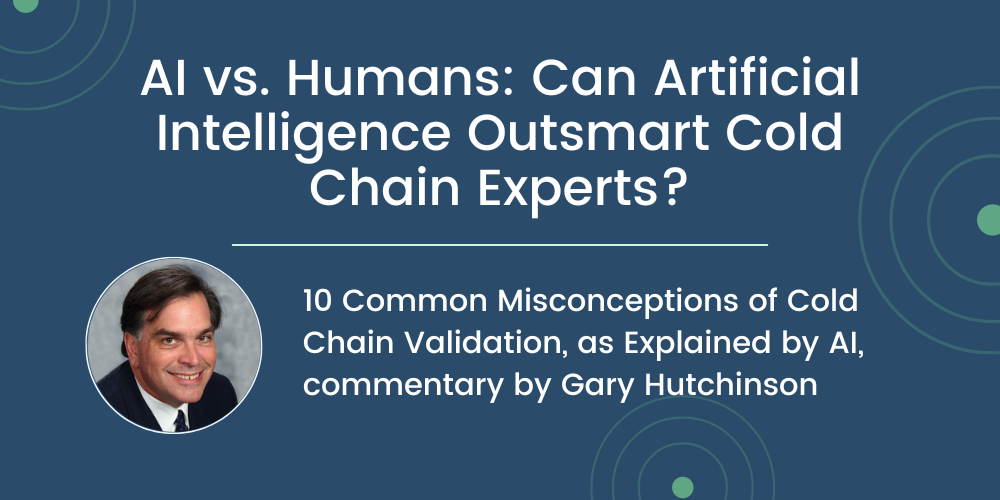AI vs. Humans: Can Artificial Intelligence Outsmart Cold Chain Experts?
10 Common Misconceptions of Cold Chain Validation, as Explained by AI, commentary by Gary...
read Details

Because the pharmaceutical cold chain is a specialized area of the pharmaceutical development process, the responsibility of cold chain distribution validation is often outsourced to third-party Cold Chain Consultants.
Cold Chain Consultants are a subset of pharmaceutical supply chain experts that focus on designing and developing temperature-sensitive distribution processes for pharmaceutical drug products.
They are often contracted for their in-depth knowledge and experience surrounding the cold chain and its regulatory requirements. Cold Chain Consultants work closely with biopharmaceutical companies to make recommendations on aspects of the cold chain, including active and passive thermal packaging, transport lane qualification, regulatory responses, and more. Because they are so commonly from a third-party company, they advise organizations on business strategies and provide an unbiased perspective on the biopharma cold chain.
And while consultants can provide valuable insight and expertise in the cold chain. Biopharma manufacturing, like many other industries who contract consultants, experiences gaps when they choose consultants who lack practical implementation expertise or have the underlying technical skills to guide their clients most effectively.
That’s why Modality Solutions built its foundation on engineering.
Einstein was a brilliant physicist, but it was engineers who applied his theory of relativity to make GPS work.
While Cold Chain Consultants can provide strategic thought-leadership, and can even be data-driven (we would be remiss to position ourselves as consulting-opposed, when really we are consulting plus), Cold Chain Engineers bring a math and science proficiency to the table that is unmatched by consultancy-only firms.
Cold Chain Engineers use scientific principles to solve cold chain challenges by designing processes that work on-paper and in the real world. Engineers drive innovation in the pharmaceutical space by applying mathematics to create innovative solutions that can be transferred to practical application.
When it comes to the biopharmaceutical cold chain, there is little time and money to waste on only ideas that work in theory, which is why engineers use their technical competence and experience to optimize your cold chain with:
A strong pharmaceutical cold chain consultant is a must when it comes to regulatory approval and a safe, temperature-controlled supply chain. We’d simply argue that you need more than just a cold chain consultant.
Engineers are analytical, well-organized problem solvers whose strong mathematical skills allow them to provide unmatched expertise for cold chain optimization. And while there are engineers with the interpersonal skills who have an affinity for creativity and higher-level business decisions (we know there are, we hired them), not all engineers are same.
That’s why Modality Solutions looks for Consulting Engineers.
Consulting Engineers have the unique ability to apply analytical science, engineering, and math skills to larger business problems. They are not only mathematically gifted, but also have strong technical writing skills and are great communicators (which comes in handy when working with your pharma company, helping draft regulatory responses, training supply chain professionals, and more).
Cold Chain Consulting Engineers can solve business problems and cold chain challenges with engineering-specific skills. Because consulting engineers have hands-on experience (from thermal packaging to transport simulation to working alongside regulatory agencies), they’re able to provide recommendations and see them through all the way through implementation. To put it plainly, this isn’t their first rodeo.
It takes a data-driven approach to validate your cold chain and ensure it withstands regulatory scrutiny and the rigors of the commercial supply chain. That’s what Modality Solutions provides through our unique Cold Chain Engineering capabilities. We’re the only provider that brings together every discipline needed for accurate, data-driven cold chain validation—combining the required chemical engineering, mechanical engineering, biomedical engineering, and packaging engineering expertise all under one roof.
10 Common Misconceptions of Cold Chain Validation, as Explained by AI, commentary by Gary...
read Details
Getting your vaccine or therapeutic approved by the FDA is a significant accomplishment. But...
read Details
This six-part article series explores Cold Chain Process Validation, addressing the multifaceted challenges and...
read Details